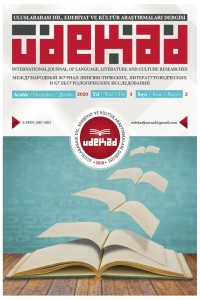Abstract
Yüzyıllardan beri insanlar arasında anlaşmayı sağlayan, kültür değerlerini nesilden nesle taşıyan, her bir süreçte kendini yenileyen ve geliştiren, kendine ait bir sistemi olan yapıya dil denir. Bu sistemin kendi içinde kuralları olsa da dışardan etkiye de her zaman açıktır. Dilin bu dinamik yapısı onu iyileştiren ve geliştiren tarafını oluştursa da bazen bu yeni yapılanma dilin zararına da olabilmektedir. Dil içinde olmayan ancak çeşitli ihtiyaçlardan veya çeşitli sebeplerden ortaya çıkan yeni kavramların oluşmasını sağlayan neolojizm, bu türden bir yapıdır. Teknolojinin gelişmesiyle birlikte coğrafyanın bir öneminin kalmaması durumu, elektronik kültür ortamında yeni yapıların ortaya çıkmasına sebep olmuştur. Dilimize çoğunlukla elektronik kültür ortamıyla yayılan yabancı kelimeler zaman içinde birtakım değişmeler göstermiştir. Buna göre zamanla yabancı kökenli sözcüklere Türkçeymiş gibi muamele edilmiş, bu kelimelere Türkçe ekler veya fiiller getirilmiştir. Bu çalışmanın amacı; elektronik kültür ortamında yaşanan bu yeni neolojizmi ele almak, yabancı kelimelere gelen Türkçe ekleri ve fiilleri tespit etmeye çalışmaktır.
References
- AKALIN, Şükrü (Editör)vd. (2009). Türkçe Sözlük (10. Baskı). Ankara: Türk Dil Kurumu Yayınları.
- AKSAN, Doğan (2004). Türkçenin Sözvarlığı. Ankara: Engin yayınevi.
- ARSLAN, Aykut-Staub Selva (2015). “Kuşak Teorisi ve İçgirişimcililk Üzerine Bir Araştırma”. Kafkas Üniversitesi İktisadi ve İdari Bilimler Fakültesi Dergisi, 6/11:1-24.
- ERGİN, Muharrem (2008). Türk Dil Bilgisi. İstanbul: Bayrak yayınevi.
- İMER, Kamile (1991). ‘Türkçenin Sözvarlığındaki Yeni Öğeler’. Dilbilim Araştırmaları, 1991, 18-28.
- KARAAĞAÇ, Günay (2013). Dil Bilimi Terimleri Sözlüğü. Ankara: TDK yayınları.
- KURAN, Evrim. (2018). Telgraftan Tablete. İstanbul: Destek Yayınları.
- OKTUĞ, Melis (2009). ‘Neolojizm Bağlamında Dilsel Üretimler/ Ekonomik Göstergeler: 2000 Yıllarında Yaşanan Ekonomik Krizin Dilbilimsel Çözümlemesi’. İstanbul Aydın Üniversitesi Dergisi, 1/1, 123-133.
- ÖZKAN, Fatma- MUSA, Bağdagül (2004). ‘Yabancı Dillerin Türkçenin Söz Dizimi Üzerine Etkisi’. Bilig Dergisi, 30/ 95-139.
- SARI, İsa (2013). ‘Dilde Yeniden Adlandırma İhtiyacı: Retonimler.’. Türkbilig Dergisi, 25: 19-26.
- TUTAR, Hasan (2018). ‘Örgütsel Davranış Kongreleri Bildirilerinde ‘ Meteforik Neolojizm’ Sorunu Üzerine Eleştirel Bir İnceleme’. İşletme Bilimi Dergisi, 6/3, 1-38.
- VARDAR, Berke (2002). ‘Dilbilim Terimleri Sözlüğü’. İstanbul, Multılıngual Yayınları.
Abstract
Language is a structure that has a system of its own, which has been providing agreement between people for centuries, carrying cultural values from generation to generation, renewing and developing itself in each process. Although this system has its own rules, it is always open to external influence. Although this dynamic structure of the language makes up the side that improves and improves it, sometimes this new structure can also be to the detriment of the language. Neologism is this kind of structure that allows the formation of new concepts that are not within the language but arise from various needs or various reasons. With the development of technology, the lack of importance of geography has led to the emergence of new structures in the electronic culture environment. Foreign words that spread to our language mostly through electronic culture have shown some changes over time. According to this, over time, foreign origin words were treated as if they were Turkish, and Turkish suffixes or verbs were introduced to these words. The aim of this study is to address this new neologism experienced in electronic culture environment and to try to identify Turkish suffixes and verbs that come to foreign words.
References
- AKALIN, Şükrü (Editör)vd. (2009). Türkçe Sözlük (10. Baskı). Ankara: Türk Dil Kurumu Yayınları.
- AKSAN, Doğan (2004). Türkçenin Sözvarlığı. Ankara: Engin yayınevi.
- ARSLAN, Aykut-Staub Selva (2015). “Kuşak Teorisi ve İçgirişimcililk Üzerine Bir Araştırma”. Kafkas Üniversitesi İktisadi ve İdari Bilimler Fakültesi Dergisi, 6/11:1-24.
- ERGİN, Muharrem (2008). Türk Dil Bilgisi. İstanbul: Bayrak yayınevi.
- İMER, Kamile (1991). ‘Türkçenin Sözvarlığındaki Yeni Öğeler’. Dilbilim Araştırmaları, 1991, 18-28.
- KARAAĞAÇ, Günay (2013). Dil Bilimi Terimleri Sözlüğü. Ankara: TDK yayınları.
- KURAN, Evrim. (2018). Telgraftan Tablete. İstanbul: Destek Yayınları.
- OKTUĞ, Melis (2009). ‘Neolojizm Bağlamında Dilsel Üretimler/ Ekonomik Göstergeler: 2000 Yıllarında Yaşanan Ekonomik Krizin Dilbilimsel Çözümlemesi’. İstanbul Aydın Üniversitesi Dergisi, 1/1, 123-133.
- ÖZKAN, Fatma- MUSA, Bağdagül (2004). ‘Yabancı Dillerin Türkçenin Söz Dizimi Üzerine Etkisi’. Bilig Dergisi, 30/ 95-139.
- SARI, İsa (2013). ‘Dilde Yeniden Adlandırma İhtiyacı: Retonimler.’. Türkbilig Dergisi, 25: 19-26.
- TUTAR, Hasan (2018). ‘Örgütsel Davranış Kongreleri Bildirilerinde ‘ Meteforik Neolojizm’ Sorunu Üzerine Eleştirel Bir İnceleme’. İşletme Bilimi Dergisi, 6/3, 1-38.
- VARDAR, Berke (2002). ‘Dilbilim Terimleri Sözlüğü’. İstanbul, Multılıngual Yayınları.
Details
| Primary Language | Turkish |
|---|---|
| Subjects | Language Studies |
| Journal Section | Research Articles |
| Authors | |
| Publication Date | December 31, 2020 |
| Submission Date | August 25, 2020 |
| Acceptance Date | November 19, 2020 |
| Published in Issue | Year 2020 Volume: 3 Issue: 2 |
* It is important for our referees to enter their fields of expertise in detail in terms of assigning referees in the process.
* The articles sent to our journal can only be withdrawn by giving reasons during the preliminary evaluation process. It is not possible to withdraw the articles that have started the evaluation process. Thank you for your understanding and we wish you good work.


